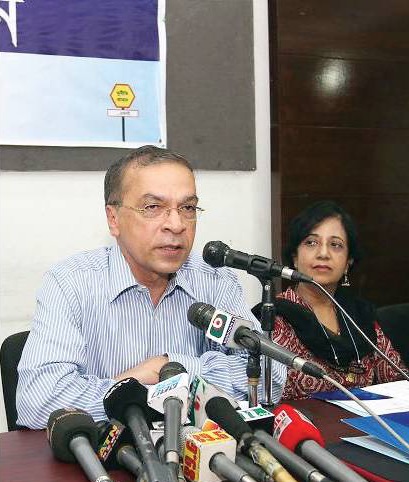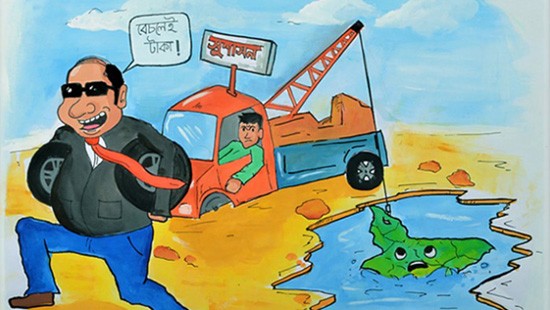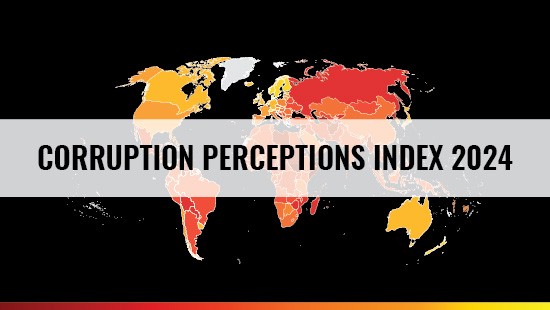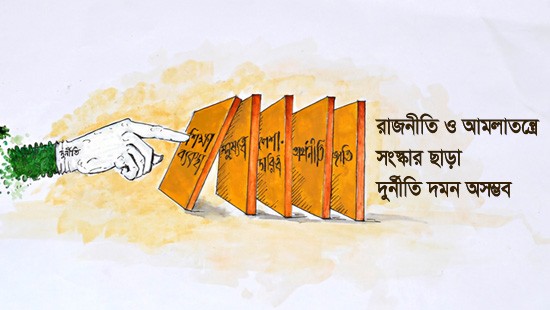Published: 13 December 2013
To have and to hold
Phil HumphreysWeekend
Phil Humphreys speaks to Iftekharuzzaman, the executive director of Transparency International Bangladesh, who shares his personal views on the struggle to seize and retain power in the upcoming parliamentary election.
What are your best and worst hopes for the polls in January?

This is a very unfortunate situation that we are in. Time is running out - if it has not already - for a negotiated settlement on an election-time government between the two major political parties. The fates of democracy and the people of this country are held hostage in the hands of the two leaders, and only they can resolve this through negotiation. But as of now, despite the telephone calls and all kinds of theatrics, I see very little indication of a genuine interest in dialogue. There can be four possible scenarios for the election, all hypothetical:
Golden dream
As an optimist I still think there is scope for a negotiated settlement, an agreement on an election-time government. And if that happens then an election is held with the participation of all political parties who have the right to do so, and who want to do so. In that case a smooth transition takes place and a reasonably international acceptable election takes place and we have the democratic process ensured. That is like the ‘golden dream’, but it looks very unlikely unfortunately.
Good dream
The second scenario is still a dream; a positive. It says that for whatever reason or incentive, the BNP and its allies decide to take part in the election even if they do not agree on the election-time government. People in Bangladesh always vote against the incumbents, all the recent polls show that they have a better chance of winning the election so why not? For many, especially the BNP leaders, it is their time. And with the international monitoring of the election, media and civil society activeness, and national and international monitoring, they might consider that this is possible. So if they do take part in the election then once again we have a good dream scenario where elections are held and a smooth transfer takes place. The losing party in that case will be unhappy and say that they will not accept the election, but that is the political culture in Bangladesh.
Bad dream
In the third scenario, the government pushes ahead with the election but the BNP and its allies don’t take part. Just as they have declared, and have been demonstrating for, they try to prevent that election, which means that the next few weeks before the so-called one-sided election may be much more violent and with much more bloodshed. In spite of that, since the government has the law enforcement and the administration under its control, they might push ahead and hold the election. In that case, the result is obvious, and then there will be a very big question mark about the credibility of that election in the eyes of the people of this country and in the eyes of the international community. Recalling the past experience of this nation, we might then be in an open-ended stage of political uncertainty; it can be a few weeks, or a few months or whatever. There may be a need for another election in whatever form, and so this looks like a bad dream.
Nightmare
The nightmare scenario is that the government wants to push ahead with the election, and the violence, bloodshed and mayhem caused by those who will be opposing it - and also the government response to prevent that violence - is such that it goes beyond the control of civilian authority. In that situation, the only thing I can forecast is that this will be extremely detrimental to the prospect of democracy in the country and the public interest, and will only demonstrate how insensitive a zero-sum game of power can be in the context of Bangladesh. The two leaders will have to take the responsibility for that.
So you have three dreams – two good and one bad – and a nightmare. Which is most likely?
Let me preface this by saying I am not ruling out anything, but as of now it is more likely that either one of the last two, unfortunately, and I feel very emotionally disappointed that this is what it is looking like.
What motivates politics in Bangladesh?
At the core of all this, corruption is a big factor because winning an election in Bangladesh means making profit. Election politics is an investment in Bangladesh, like it is in many countries of the world, but here it is a total gain so people consider that the people’s mandate is a mandate to make profit out of the investment that they have made, so office of government and politics is considered as an office of profit. As a result, the government institutions become the monopolised territory of the ruling party or coalition.
What happens if there is no return on that investment?
From the opposite end, if you lose the election you think that you have lost everything so you don’t have any role to play in parliament or anywhere else except in the street. That leads to a risk factor, first about losing the opportunity of making profit, and second because as much as the benefit of winning is increasing, the risk of losing is also going higher and higher. People don’t want to consider a scenario that they can be beaten in the election; they have to remain in power or they have to make sure that they come back to power. It is all or nothing, and at the core of it is corruption. Bangladesh has to recognise that corruption is a huge problem and they cannot continue to have a denial syndrome anymore.
“I will not be surprised if we do not even see an election in January. It can be postponed in a few days at any time.”
WT: Surely the Awami League could not reject the polls result if they have been championing the election commission?
Iftekhar: They might still say it if they lose, that is the political culture in Bangladesh.
WT: So the election commission that is so safe and solid now, suddenly isn’t?
Iftekhar: Exactly, yes.
This interview has been taken on 3 December and was published in Dhaka Tribune on 14 December, 2013







